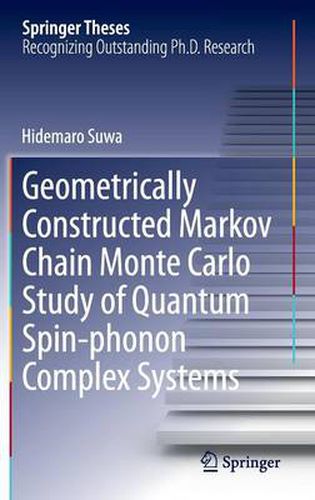Readings Newsletter
Become a Readings Member to make your shopping experience even easier.
Sign in or sign up for free!
You’re not far away from qualifying for FREE standard shipping within Australia
You’ve qualified for FREE standard shipping within Australia
The cart is loading…






This title is printed to order. This book may have been self-published. If so, we cannot guarantee the quality of the content. In the main most books will have gone through the editing process however some may not. We therefore suggest that you be aware of this before ordering this book. If in doubt check either the author or publisher’s details as we are unable to accept any returns unless they are faulty. Please contact us if you have any questions.
In this thesis, novel Monte Carlo methods for precisely calculating the critical phenomena of the effectively frustrated quantum spin system are developed and applied to the critical phenomena of the spin-Peierls systems. Three significant methods are introduced for the first time: a new optimization algorithm of the Markov chain transition kernel based on the geometric weight-allocation approach, the extension of the worm (directed-loop) algorithm to nonconserved particles, and the combination with the level spectroscopy. Utilizing these methods, the phase diagram of the one-dimensional XXZ spin-Peierls system is elucidated. Furthermore, the multi-chain and two-dimensional spin-Peierls systems with interchain lattice interaction are investigated. The unbiased simulation shows that the interesting quantum phase transition between the 1D-like liquid phase and the macroscopically-degenerated dimer phase occurs on the fully-frustrated parameter line that separates the doubly-degenerated dimer phases in the two-dimensional phase diagram. The spin-phonon interaction in the spin-Peierls system introduces the spin frustration, which usually hinders the quantum Monte Carlo analysis, owing to the notorious negative sign problem. In this thesis, the author has succeeded in precisely calculating the critical phenomena of the effectively frustrated quantum spin system by means of the quantum Monte Carlo method without the negative sign.
$9.00 standard shipping within Australia
FREE standard shipping within Australia for orders over $100.00
Express & International shipping calculated at checkout
This title is printed to order. This book may have been self-published. If so, we cannot guarantee the quality of the content. In the main most books will have gone through the editing process however some may not. We therefore suggest that you be aware of this before ordering this book. If in doubt check either the author or publisher’s details as we are unable to accept any returns unless they are faulty. Please contact us if you have any questions.
In this thesis, novel Monte Carlo methods for precisely calculating the critical phenomena of the effectively frustrated quantum spin system are developed and applied to the critical phenomena of the spin-Peierls systems. Three significant methods are introduced for the first time: a new optimization algorithm of the Markov chain transition kernel based on the geometric weight-allocation approach, the extension of the worm (directed-loop) algorithm to nonconserved particles, and the combination with the level spectroscopy. Utilizing these methods, the phase diagram of the one-dimensional XXZ spin-Peierls system is elucidated. Furthermore, the multi-chain and two-dimensional spin-Peierls systems with interchain lattice interaction are investigated. The unbiased simulation shows that the interesting quantum phase transition between the 1D-like liquid phase and the macroscopically-degenerated dimer phase occurs on the fully-frustrated parameter line that separates the doubly-degenerated dimer phases in the two-dimensional phase diagram. The spin-phonon interaction in the spin-Peierls system introduces the spin frustration, which usually hinders the quantum Monte Carlo analysis, owing to the notorious negative sign problem. In this thesis, the author has succeeded in precisely calculating the critical phenomena of the effectively frustrated quantum spin system by means of the quantum Monte Carlo method without the negative sign.